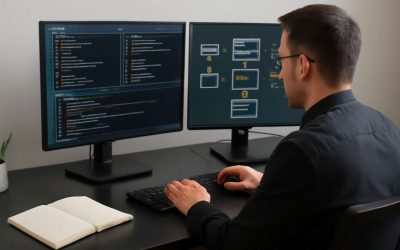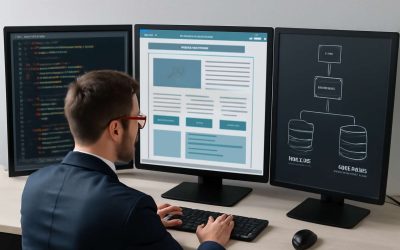Understanding the Full Stack Developer Certification
What is a Full Stack Developer Certification?
Embarking on the journey to become a full stack developer is akin to unlocking a secret portal to the digital universe. At the heart of this adventure lies the full stack developer certification—a coveted badge that signifies mastery over both front-end and back-end landscapes. It’s more than just a credential; it’s a testament to a developer’s versatility and depth of understanding in the ever-evolving world of technology.
The full stack developer exam is designed to challenge and validate a candidate’s proficiency across a spectrum of skills, from designing intuitive interfaces to managing complex server-side logic. Achieving this certification often involves demonstrating knowledge in areas such as database management, server scripting, and user experience design. For many aspiring developers in South Africa, passing the full stack developer exam opens doors to opportunities that were previously out of reach, transforming passion into a thriving career.
- Comprehensive understanding of both client-side and server-side development
- Proficiency in multiple programming languages and frameworks
- Ability to build scalable, secure, and efficient applications
Why Obtain a Full Stack Developer Certification?
Understanding the Full Stack Developer Certification is like unlocking a treasure chest of digital mastery. It’s a bridge between creative design and robust backend engineering, symbolizing a developer’s ability to craft seamless applications from start to finish. The full stack developer exam isn’t just a test; it’s an odyssey that probes the depths of both client-side and server-side development, pushing candidates to demonstrate their ingenuity and technical prowess.
Achieving this certification signifies more than just skill—it embodies versatility and adaptability in an ever-shifting tech landscape. For aspiring developers in South Africa, passing the full stack developer exam can be the turning point that transforms a passion for coding into a sustainable career. It’s a mark of excellence that opens doors to dynamic opportunities, empowering professionals to build scalable, secure, and efficient applications with confidence.
Types of Full Stack Developer Exams
Understanding the full stack developer certification involves more than just passing a test; it’s an exploration into the diverse landscape of web development. The full stack developer exam varies depending on the provider and the skill level targeted, offering a spectrum of challenges designed to assess comprehensive expertise. In South Africa, aspiring developers often encounter different types of full stack developer exams, each tailored to specific career paths or industry needs.
Most certifications fall into two broad categories: foundational and advanced. The foundational full stack developer exam typically covers core concepts like HTML, CSS, JavaScript, and basic backend frameworks, establishing a solid base. The advanced exams, however, delve deeper into complex topics such as microservices architecture, security protocols, and cloud integration, demanding a higher level of proficiency.
For those seeking a structured pathway, the most popular full stack developer exam formats include:
- Multiple-choice assessments to evaluate theoretical knowledge
- Practical coding challenges that simulate real-world scenarios
- Project-based evaluations to demonstrate holistic understanding
Each type of exam aims to gauge not only technical skills but also problem-solving ability and adaptability—crucial traits for any full stack developer navigating South Africa’s dynamic tech environment.
Benefits of Passing the Full Stack Developer Exam
Passing the full stack developer exam can unlock a wealth of opportunities in South Africa’s competitive tech industry. Certification not only validates your technical prowess but also signals to employers that you possess a comprehensive understanding of both front-end and back-end development. This recognition often translates into higher earning potential and more advanced roles.
Moreover, achieving certification demonstrates your commitment to continuous learning — a trait highly valued in a rapidly evolving field. It can also serve as a stepping stone for specialized careers such as DevOps, cloud architecture, or cybersecurity. The full stack developer exam is designed to test a broad spectrum of skills, ensuring that certified professionals are well-rounded and adaptable to changing project requirements.
For those looking to stand out, some certifications include practical components like coding challenges or project evaluations, which showcase real-world competency. Ultimately, passing the full stack developer exam is a strategic move that affirms your readiness to meet South Africa’s digital demands and thrive in a dynamic job market.
Key Topics Covered in the Full Stack Developer Exam
Front-End Technologies
The full stack developer exam reveals a mastery of front-end technologies that are essential for crafting seamless user experiences. It dives deep into the core principles of modern web development, testing your ability to create dynamic, responsive interfaces that captivate users. Understanding these technologies isn’t just a checkbox; it’s the key to unlocking versatile development skills that stand out in South Africa’s competitive tech landscape.
Key topics covered in the full stack developer exam for front-end technologies include a thorough understanding of HTML5, CSS3, and JavaScript. These foundational elements form the backbone of any web application, enabling developers to build visually appealing and highly functional interfaces. Additionally, the exam emphasizes knowledge of frameworks and libraries such as React, Angular, or Vue.js, which streamline development and enhance user engagement.
To excel, candidates should also be familiar with version control systems like Git, which are crucial for collaborative projects. Mastery of responsive design principles ensures applications look great on any device, a vital skill in the mobile-first era. The full stack developer exam often challenges test-takers to demonstrate their ability to integrate these front-end components with back-end services, creating a cohesive and efficient web environment.
Back-End Technologies
The back-end segment of the full stack developer exam delves into the core technologies that power robust web applications. It’s where the puzzle of server-side logic, database management, and API integration comes together. Mastery in this area ensures the developer can build scalable, secure, and efficient systems that meet real-world demands.
Key topics covered include understanding server frameworks like Node.js, Django, or Spring Boot, which facilitate rapid development and maintainability. Candidates are also tested on database systems such as MySQL, PostgreSQL, or MongoDB, emphasizing data structuring and retrieval techniques. A solid grasp of RESTful API design and development is essential, often assessed through practical scenarios. These APIs serve as the backbone for front-end and mobile integrations, making their mastery a critical part of the full stack developer exam.
- Proficiency in server deployment and cloud services like AWS or Azure
- Security best practices, including authentication and authorization protocols
- Knowledge of caching mechanisms and performance optimization
Understanding how to connect the dots between back-end services and front-end interfaces is what elevates a developer’s skill set. The full stack developer exam challenges candidates to demonstrate this integration, ensuring they are well-equipped for the dynamic tech landscape in South Africa and beyond.
DevOps and Deployment
In the realm of the full stack developer exam, mastering DevOps and deployment strategies is not merely an option—it’s a necessity. As digital landscapes evolve at a breakneck pace, the ability to seamlessly deploy applications, monitor performance, and ensure reliability distinguishes the truly competent from the merely competent. It’s no longer enough to write elegant code; one must also understand how to deliver it efficiently into the hands of users.
Key topics covered include continuous integration and continuous deployment (CI/CD), which streamline the release process and reduce downtime. Candidates are expected to demonstrate familiarity with containerization tools like Docker and orchestration platforms such as Kubernetes. These tools are the backbone of modern deployment pipelines, ensuring that applications remain scalable and resilient under varying loads.
Furthermore, the full stack developer exam often tests knowledge of cloud services—particularly AWS or Azure—where deployment becomes a strategic game of resource management and security. An understanding of monitoring tools like Prometheus or Grafana, along with troubleshooting techniques, elevates a developer’s ability to maintain robust systems. After all, in today’s competitive tech arena, the ability to deploy and manage applications with finesse is as vital as the code itself.
Software Engineering Principles
Within the labyrinth of the full stack developer exam, understanding the core principles of software engineering is akin to grasping the very blueprint of digital mastery. These principles serve as the compass guiding developers through complex terrains of code, architecture, and deployment, ensuring that each component harmonizes in symphony. Mastery in this realm demands more than rote memorization; it requires an intuitive understanding of how systems interconnect and evolve.
Fundamental topics such as system design, scalability, and security feature prominently on the exam, demanding candidates to think beyond lines of code into the broader landscape of software architecture. An adept developer must also be conversant with algorithms, data structures, and best practices in coding efficiency. This knowledge forms the bedrock upon which resilient, high-performing applications are built, scrutinized, and refined.
To truly excel in the full stack developer exam, one must navigate a tapestry of interconnected concepts, often illustrated through practical scenarios and problem-solving exercises. An ordered approach might look like:
- Understanding the principles of clean code and maintainability
- Applying design patterns to solve recurring challenges
- Implementing secure authentication and authorization mechanisms
- Optimizing database interactions for performance and reliability
Each of these threads weaves into the fabric of software engineering, elevating a developer from mere coder to architect of digital excellence. It’s a pursuit that demands both intellectual rigor and creative finesse—an art as much as it is a science—making the mastery of these principles essential for conquering the full stack developer exam with confidence and grace.
Preparation Strategies for the Full Stack Developer Exam
Recommended Study Resources
In the shadowed corridors of the tech realm, preparing for the full stack developer exam demands more than mere memorization—it beckons a deep, almost ritualistic immersion into the craft. Success lies in the alchemy of strategic study and relentless focus. To traverse this labyrinth, aspiring developers must harness a curated arsenal of study resources that illuminate the obscure corners of both front-end and back-end technologies. The right tools can transform a daunting challenge into a guided journey through digital catacombs.
Recommended study resources serve as mystical artifacts—guides, tutorials, and practice exams—that sharpen your skills and deepen your understanding. For those seeking a comprehensive approach, consider enrolling in online platforms that offer structured courses, interactive coding challenges, and mock tests. These resources not only bolster knowledge but also forge resilience against the shadows of uncertainty. Remember, the full stack developer exam is a crucible—only with well-chosen tools and disciplined preparation can you emerge victorious from this arcane trial.
Hands-On Practical Experience
In the labyrinth of preparation, hands-on practical experience emerges as the beacon—guiding aspiring full stack developers through the shadowed corridors of the exam. It’s not enough to simply study theories and memorize frameworks; true mastery blossoms when you wield your skills in real-world scenarios. The full stack developer exam demands a symphony of knowledge and application, where every line of code tells a story of problem-solving finesse and adaptive thinking.
Embarking on this journey, immersive practice becomes your most loyal companion. Engage with coding challenges that mimic the complexities of actual projects—debugging, deploying, and iterating until the concepts are etched into muscle memory. To cement your readiness, consider structuring your preparation around a sequence of practical tasks:
- Build a full CRUD application that integrates front-end and back-end logic seamlessly.
- Deploy your projects on cloud platforms to grasp the intricacies of DevOps and deployment pipelines.
- Consistently participate in coding challenges that mirror the challenges posed by the full stack developer exam.
By immersing yourself in these tangible experiences, you forge a resilience that mere theoretical study cannot provide. The true essence of excelling in the full stack developer exam lies in transforming knowledge into action—making each project a stepping stone toward mastery and victory.
Time Management and Study Schedule
Effective time management is the backbone of a successful full stack developer exam preparation. With so much material to cover, creating a structured study schedule ensures that no topic is left behind. Prioritize your learning by dividing your study sessions into focused blocks, dedicating specific days to front-end, back-end, and DevOps concepts.
Balancing study and practical work can be challenging, but it’s essential. Incorporate regular breaks and realistic goals to maintain motivation. Remember, consistent effort over time is more valuable than cramming last minute. For optimal results, consider using a combination of revision tools, online courses, and coding challenges.
A well-crafted study plan that includes dedicated time for hands-on practical experience will keep you on track. The journey to passing the full stack developer exam isn’t just about hard work—it’s about working smart, with a clear schedule guiding your path.
Exam Format and Registration Details
Exam Format
The full stack developer exam is designed to rigorously evaluate a candidate’s proficiency across the entire spectrum of web development. Typically, this exam format is a combination of theoretical questions and practical tasks that simulate real-world scenarios. Most assessments are conducted online, offering flexibility for busy professionals in South Africa who are balancing work and study.
The registration process is straightforward but requires careful attention to detail. Candidates need to create an account on the official certification portal, submit relevant identification, and select their preferred exam date. It’s crucial to register early, as slots can fill quickly, especially during peak seasons. The exam itself usually spans several hours, often divided into multiple sections that cover both front-end and back-end technologies.
To give clarity, here’s a typical breakdown of the full stack developer exam format:
- Multiple-choice questions testing foundational knowledge
- Hands-on coding challenges for front-end and back-end skills
- Scenario-based problem-solving exercises
Understanding this structure helps candidates craft an effective study plan, ensuring they are well-prepared for both the theoretical and practical components of the full stack developer exam. Preparation and registration are the first steps toward mastery in this competitive field!
Registration Process
The full stack developer exam is a pinnacle moment for aspiring tech professionals in South Africa—an intense challenge that tests both breadth and depth of knowledge. Registration for this exam is a crucial step that demands meticulous attention. The process is straightforward but demands precision, as early registration ensures access to limited exam slots. Candidates need to create an account on the official certification portal, submit valid identification, and select their preferred exam date. With most assessments conducted online, flexibility is a major advantage for busy individuals juggling work and study.
Typically, the full stack developer exam spans several hours, divided into multiple sections to evaluate a candidate’s proficiency in both front-end and back-end technologies. The exam format often includes:
- Multiple-choice questions testing foundational knowledge
- Hands-on coding challenges for front-end and back-end skills
- Scenario-based problem-solving exercises
This structure ensures a comprehensive evaluation, helping candidates craft a strategic study plan tailored to mastering all facets of the full stack developer exam. Preparing well and registering early are vital steps on the journey toward success in this competitive field!
Tips for Success in the Full Stack Developer Exam
Understanding the Exam Objectives
In the shadowed corridors of mastery, understanding the full stack developer exam objectives is akin to deciphering ancient runes—an essential step to unlock the secrets of success. Without a clear grasp of what the exam demands, even the most promising candidates risk wandering aimlessly through the labyrinth of technical knowledge.
A wise strategist once whispered, “Know thy enemy,” and in this context, that enemy is the exam itself. Dive deep into the core objectives, and identify the key domains—front-end, back-end, DevOps, and software engineering principles—that form the backbone of the full stack developer exam.
To truly succeed, consider mapping out a structured study plan that aligns with these objectives. This ensures your preparation is targeted, precise, and unerring in its focus. Remember, the exam is not merely a test of rote memorization but an exploration of your holistic understanding of the full stack developer landscape.
Time Management During the Exam
When tackling the full stack developer exam, time management can be the difference between success and failure. The pressure to answer questions accurately and efficiently is intense, especially when the clock is ticking. Staying calm and focused allows you to allocate your mental energy wisely, ensuring you don’t get bogged down on difficult questions.
One effective strategy is to divide the exam into manageable segments. For example, dedicate a specific amount of time to each section—front-end, back-end, and DevOps—so you can gauge your pace and avoid rushing through questions. Remember, the full stack developer exam often includes a mix of multiple-choice questions and practical tasks, making it crucial to balance speed with precision.
Consider using a structured approach—like the Pomodoro technique—to keep your mind fresh. Prioritize questions you’re confident about first, then revisit the tougher ones with a clearer perspective. Keeping track of your time with a simple watch or timer can prevent those unforeseen moments of panic. Ultimately, mastering time management during the full stack developer exam empowers you to showcase your holistic expertise without unnecessary stress, paving the way for certification success!
Effective Practice and Review
Success in the full stack developer exam hinges on more than just rote memorization; it demands deliberate practice that penetrates deeply into your understanding. Engaging in consistent, focused review sessions allows you to identify gaps and solidify your grasp of complex concepts. As you simulate real exam conditions, you sharpen not only your technical skills but also your mental resilience, fostering clarity amidst pressure.
Effective practice involves immersing yourself in practical tasks that mirror the exam’s hands-on components, ensuring you develop an intuitive flow with technologies like front-end frameworks, back-end APIs, and deployment strategies. Repeating this cycle of thorough review and active application cultivates confidence, transforming knowledge into instinct.
In this journey, harnessing structured study routines—such as spaced repetition or focused blocks—can accelerate mastery. Remember, the full stack developer exam is as much a test of mental endurance as it is technical prowess. Preparing with intention and rigor elevates your chances of passing, turning a daunting challenge into a testament of your holistic expertise.
Maintaining Confidence and Reduce Exam Anxiety
Maintaining confidence during the full stack developer exam can be challenging, especially when nerves threaten to take over. A steady mindset helps you focus and perform at your best. To reduce exam anxiety, practice deep breathing techniques and stick to a well-structured study routine. This consistency builds familiarity with the exam format and boosts self-assurance.
Remember, the full stack developer exam tests a broad skill set, but staying calm allows you to think clearly and apply your knowledge effectively. Some candidates find it helpful to visualize success or affirm their preparation, which can strengthen mental resilience.
An effective approach is to approach the exam as a problem-solving challenge rather than a test of memory alone. Trust your preparation, stay composed, and your confidence will shine through. After all, a calm mind is the key to unlocking your full potential in the full stack developer exam.




0 Comments